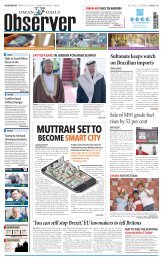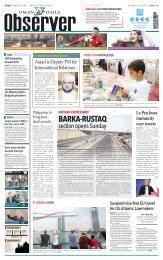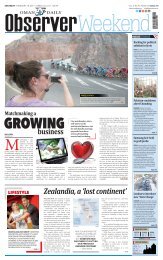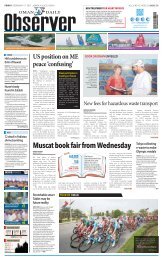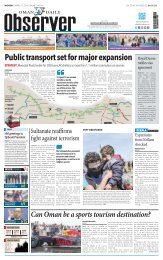CHALLENGES
PbSz100zzZF
PbSz100zzZF
You also want an ePaper? Increase the reach of your titles
YUMPU automatically turns print PDFs into web optimized ePapers that Google loves.
6 REGION GO<br />
OMANDAILYOBSERVER SATURDAY l JANUARY 28 l 2017<br />
JUBILATION OVER VICTORY<br />
Morocco to rejoin African<br />
Union after 33 years<br />
Lieutenant General Abdelwahab al Saadi (C) celebrates with Iraqi people as they raise the Iraqi flag in the same place where IS militants raised their flag two years ago in<br />
Mosul on Friday. — Reuters<br />
RABAT: After leaving the pan-<br />
African organisation three decades<br />
ago, Morocco is set to rejoin the<br />
African Union during its 28th African<br />
summit scheduled for January 30-<br />
31 in Addis Ababa. Morocco in<br />
1984 decided to withdraw from the<br />
Organisation of African Unity, which<br />
later became the AU. Morocco has<br />
since then refused to be part of the<br />
organisation, but recently it changed<br />
its policy, making the re-admission<br />
to the AU on the top of its agenda,<br />
Xinhua news agency reported.<br />
King Mohammed VI in July last<br />
year sent a message to the 27th AU<br />
summit in Kigali, saying his country<br />
“should not remain outside its African<br />
institutional family, and it should<br />
regain its natural, rightful place within<br />
the AU”.<br />
Explaining the reasons for<br />
returning to the pan-African<br />
organisation, the king cited “the<br />
repeated call of many African friends<br />
of the kingdom as well as a thorough<br />
reflection”. He also stressed that from<br />
within, “Morocco will contribute<br />
to making the AU a more robust<br />
organisation, one that is both proud<br />
of its credibility and relieved of the<br />
trappings of an obsolete era”. Two<br />
months after the king’s message to the<br />
Explaining the<br />
reasons for returning<br />
to the pan-African<br />
organisation, the<br />
king cited ‘the<br />
repeated call of many<br />
African friends of the<br />
kingdom as well as a<br />
thorough reflection’<br />
African leaders, the North African<br />
kingdom in September formally<br />
submitted a request to re-join the<br />
continental body. The request was<br />
submitted after it received the support<br />
of a group of 28 AU member states,<br />
representing more than the majority<br />
of the 54 African Union member<br />
states required for admission.<br />
Following this request, the Moroccan<br />
king toured numerous African<br />
countries. Consequently, the kingdom<br />
raised the total of supporters to its bid<br />
to 40 as was announced by Moroccan<br />
Foreign Minister Salaheddine Mezouar<br />
during a parliamentary session to<br />
review constitutive act of AU a week<br />
earlier. — IANS<br />
Trump plans stronger<br />
campaign against IS<br />
BATTLE-READY<br />
WASHINGTON: US President<br />
Donald Trump is expected to order<br />
up a new plan for defeating the IS<br />
group with expanded US military<br />
involvement as he was scheduled to<br />
make his first visit to the Pentagon on<br />
Friday.<br />
Trump, who pledged to eradicate<br />
the extremist group during the<br />
presidential campaign, is reportedly<br />
preparing to direct new Defence<br />
Secretary James Mattis to more<br />
aggressively attack IS positions with the<br />
aim of defeating them more quickly.<br />
That could mean more US forces and<br />
military hardware moving into Iraq<br />
and Syria, according to analysts.<br />
“We have to get rid of ISIS. We<br />
have no choice,” Trump told Fox<br />
News’s Sean Hannity in an interview<br />
broadcast on Thursday, using another<br />
acronym for the group.<br />
“This is evil. This is a level of evil<br />
that we haven’t seen.”<br />
After his predecessor Barack<br />
Obama took a longer term view<br />
of the anti-IS fight, with a more<br />
cautious commitment of US forces,<br />
“President Trump might be looking<br />
for something with quicker results,<br />
that could put some more options on<br />
the table,” retired general David Barno<br />
told National Public Radio on Friday.<br />
The Wall Street Journal reported<br />
Last week, General<br />
Joe Dunford,<br />
Chairman of the<br />
Joint Chiefs of<br />
Staff, said he would<br />
present Mattis with<br />
options to “accelerate<br />
the campaign”<br />
against IS<br />
that Trump will give the Pentagon<br />
30 days to come up with a new set<br />
of options for a tougher campaign<br />
against IS.<br />
The United States currently has<br />
5,000 troops in Iraq and 500 in Syria as<br />
“advisers” — but also US artillery and<br />
aircraft to help in the fight.<br />
They have provided substantial<br />
support to the assault led by Iraqi<br />
forces on IS’s hold on the key city of<br />
Mosul.<br />
The slow, steady assault has driven<br />
IS fighters out of the part of the city on<br />
the east bank of the Tigris River, and<br />
forces are now preparing an assault on<br />
IS-held Mosul neighbourhoods on the<br />
river’s west bank.<br />
According to reports, an escalation<br />
of the US role could involve more US<br />
armour and helicopters involved in the<br />
assaults on IS positions together with<br />
Iraqi, Turkish and Kurdish forces.<br />
Trump “could elect to put<br />
American boots on the ground on<br />
larger numbers,” Barno said. “That all<br />
entails new uses of military power....<br />
and that opens the prospect of a deeper<br />
involvement with more casualties.”<br />
Trump promised during his<br />
presidential campaign to eliminate IS,<br />
saying he had a secret plan to quickly<br />
defeat the group.<br />
Last week, General Joe Dunford,<br />
Chairman of the Joint Chiefs of Staff,<br />
said he would present Mattis with<br />
options to “accelerate the campaign”<br />
against IS. “What is really important is<br />
first that we have a conversation about<br />
what we are doing today, why we are<br />
doing it, and what other things might<br />
be done and why we haven’t done it<br />
to date,” Dunford told reporters in<br />
Brussels.<br />
Trump is also open to conducting<br />
joint operations with Russia against<br />
the IS in Syria, his spokesman said<br />
earlier this week. “If there’s a way we<br />
can combat ISIS with any country,<br />
whether it’s Russia or anyone else, and<br />
we have a shared national interest in<br />
that, sure, we’ll take it,” press secretary<br />
Sean Spicer told reporters. — AFP<br />
TEHRAN: A senior Iranian firefighter<br />
paid tribute on Friday to rescuers’<br />
bravery tackling a blaze last week that<br />
triggered the collapse of Tehran’s oldest<br />
high-rise, killing 26 people.<br />
The 15-storey Plasco building<br />
toppled on January 19 while emergency<br />
services were still evacuating people<br />
from it, four hours into the inferno.<br />
Amir Mahdiani, a fire department<br />
commander, addressed worshippers at<br />
Friday prayers in Tehran’s vast Mosalla<br />
mosque as the search for those still<br />
missing in the collapse neared its end.<br />
“If it wasn’t for the sacrifice of the<br />
firemen, maybe the building would<br />
have collapsed two hours earlier and<br />
hundreds would be buried,” he said,<br />
before bursting into tears.<br />
His leg was in a splint due to an<br />
injury sustained during the fire.<br />
Mahdiani said the death toll<br />
could have been lower if people had<br />
cooperated with the authorities and left<br />
the building more promptly.<br />
He urged the government to help<br />
import modern firefighting equipment.<br />
The Plasco building was Iran’s oldest<br />
high-rise and contained a shopping<br />
centre and hundreds of clothes shops<br />
and workshops.<br />
The bodies of 15 firefighters and<br />
four civilians had been recovered from<br />
the rubble by Friday while six were still<br />
missing, the fire service said. Another<br />
firefighter died in hospital.<br />
Bulldozers had removed 1,600<br />
truckfuls of rubble from the site by Friday<br />
reaching underground floors after nine<br />
days of searching with sniffer dogs.<br />
A member of East<br />
Libyan forces holds<br />
his weapon in<br />
Ganfouda district in<br />
Benghazi, Libya.<br />
— Reuters<br />
Tehran fire chief praises bravery in tower blaze<br />
Some of the bodies recovered were<br />
unidentifiable and awaited DNA testing.<br />
Authorities said the firefighters<br />
would be buried as “martyrs” next to<br />
those killed in a stampede during the<br />
2015 hajj pilgrimage.<br />
The last body was recovered late on<br />
Thursday and officials hoped to clean up<br />
and lift traffic restrictions near the site by<br />
Saturday.<br />
A deputy mayor said crews removing<br />
the rubble were set to complete the job<br />
by around 5 pm (1330 GMT) on Friday.<br />
The damage was estimated at 15,000<br />
billion rials ($390 million) and some<br />
3,500 workers lost their jobs as a result of<br />
the blaze.<br />
The government announced a relief<br />
programme to help businesses and<br />
uninsured workers. — AFP<br />
Aleppo traders clear debris from war-scarred souq<br />
ALEPPO: In Syria’s Aleppo, men throw rubble<br />
into the courtyard of a historic inn as merchants<br />
gather below to oversee the resurrection of<br />
their war-battered shops.<br />
The shopkeepers have returned for the first<br />
time to clear the debris left behind by years of<br />
fighting after their century-old trading ground<br />
became a front line.<br />
“I was so happy to see my shop still standing<br />
amid the trash despite a little damage,” says<br />
Antoun Baqqal, 66, one of the traders in the<br />
Khayr Beyk Khan.<br />
Once famous for its bustling souqs and old<br />
citadel, Aleppo’s Old City has been rendered<br />
almost unrecognisable by some of the worst<br />
violence in Syria’s nearly six-year conflict.<br />
After years of fighting, many of the city’s<br />
famed souqs have been completely destroyed.<br />
But the shops of Khayr Beyk have largely<br />
survived, even if some stores inside the twofloor<br />
inn, known in the region as a khan, have<br />
seen their facades ripped off in the fighting.<br />
I was so happy to see<br />
my shop still standing<br />
amid the trash despite a<br />
little damage<br />
ANTOUN BAQQAL<br />
One of the traders<br />
“I sent my friends pictures of their shops<br />
to encourage them to come back, until they all<br />
returned one by one,” Baqqal says.<br />
Rebels overran east Aleppo in the summer<br />
of 2012, effectively dividing the city into a<br />
regime-held west and opposition-controlled<br />
east. “The army was here. They used to sleep<br />
upstairs and downstairs in the shops,” Baqqal<br />
Mohammed Nour Mimi (R) walks through Aleppo’s historic souq on Friday as he returns to his store,<br />
alongside other shopkeepers, for the first time to clear the debris left behind by years of fighting<br />
after their century-old trading ground became a front line. — AFP<br />
says. But after regime forces seized east Aleppo<br />
in December, retaking the whole city, he<br />
was able to return to the cloth workshop he<br />
inherited from his father.<br />
When he found his father’s photo lying on<br />
the ground, he dusted it off and hung it back up<br />
on the wall. “I’m going to tidy up the workshop<br />
so my son can take over, so he can put my photo<br />
next to my father’s one day and remember me<br />
fondly.”<br />
In the courtyard, Zakaria Aziza, 55, scrolls<br />
through his phone, comparing old pictures of<br />
the more than a dozen shops he owns to their<br />
appearance today.<br />
Customers used to flock from across the<br />
Arab region to admire the shopping venue’s<br />
textiles, he says. “The khan once overflowed<br />
with material. You could hardly walk between<br />
the shops for all the customers,” Aziza says.<br />
“Today it’s also hard to walk around — but<br />
this time it’s because of all the rubble and trash.”<br />
— AFP



